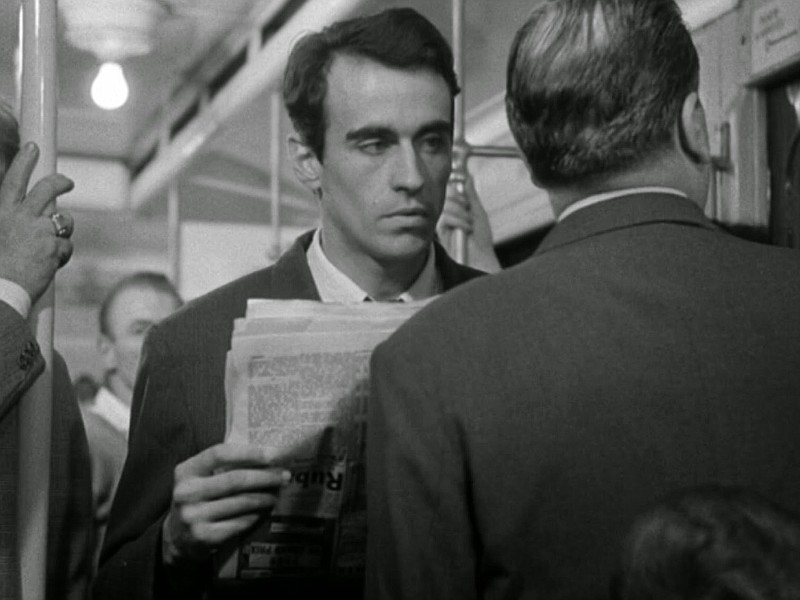We watched Robert Bresson's "Pickpocket" (1959) the other night.
It's a straightforward film, more adjacent to the French New Wave than really a part of it, and it appears to be loosely based — or maybe inspired — by Dostoevsky's "Crime and Punishment." And if you break down the plot, it's the same as the Russian novel: A man breaks the law, is caught and sent to prison, where his misery is relieved by the love of a good woman.
But Bresson's title character, a failed young would-be writer named Michel (played by Uruguayan Martin LaSalle, who was acting for the first time) doesn't have the rigor or self-awareness of Raskolnikov.
Like Raskolnikov, Michel finds himself in need of money to live, and believes that there are superior people who should be exempt from the law because of their potential contribution to society.
But while Raskolnikov commits a genuinely monstrous act — he ax-murders an old pawnbroker who stores money and valuables in her flat — because he believes the windfall will liberate him from poverty and allow him to achieve his destined greatness, Michel is a common petty thief, eking out a subsistence living by committing crimes of opportunity.
Michel is grand only in his rhetoric. He is neither Nietzschean uber mensch nor monster, only pathetic. He would be better off getting a job than living from risk to risk. His crimes are petty, insufficient to his ambition.
STEAL BIG
Everyone knows that if you're going to steal, you should steal big. Otherwise you just end up in jail.
It may not be that every great fortune was founded on a great crime, but let's not overlook the business advantages that accrue to criminals.
A criminal needn't worry about delivering on promises or respecting fiduciary duties. A criminal can lie. A criminal can misrepresent themselves and their abilities. A criminal can do all this and, if they are a little bit careful, still manage to avoid serious legal consequences — to avoid being deemed a criminal held accountable for their actions. A criminal can edge-walk, do things that the conscience of an honest person will not allow.
So if you want to succeed in business, one of the ways forward is to become a criminal. Not necessarily the kind who robs people at gunpoint or smashes windows to grab merchandise — those unsubtle criminals are often caught and punished — but to become the kind of criminal that people envy. The kind of criminal that traffics in dreams and relies on the unmet desires of others to further their own grand designs.
The kind of criminal who, if ultimately successful, might be lionized as a captain of industry or master of the universe, or at least excused as a rare and superior creature, a genius to which no laws ought to apply.
The sort of unicorn they might make a prestige television drama series about. ("Unicorn" is apparently a term of art in the tech industry that refers to a privately held start-up valued at more than $1 billion. I'm using it in the more general sense of a very rare individual who has magical powers. They don't exist, by the way.)
Just before we watched "Pickpocket," we caught the final episode of Shonda Rhimes' "Inventing Anna" on Netflix in which Julia Garner, better known in some circles as Ruth from "Ozark," portrays Anna Delvey, real name Anna Sorokin, a fake German heiress who swindled hotels, banks, flying services and human beings.
We haven't quite made it through the Showtime series "Super Pumped," which stars Joseph Gordon-Levitt as former Uber chief executive officer and horrible boss Travis Kalanick. The series is based on the book "Super Pumped: The Battle for Uber" by Mike Isaac.
We've also been watching "WeCrashed," in which Anne Hathaway and Jared Leto star as Rebekah and Adam Neumann, the entrepreneurial couple instrumental in the launch and crash of WeWork, a provider of physical and virtual "co-working spaces."
WeWork is still around, and though Adam is no longer CEO, he received $1.7 billion for his stake in the company when he stepped down from the board, and still gets a $46 million yearly salary as a consultant to the board.
We haven't seen Amanda Seyfried as indicted Theranos CEO Elizabeth Holmes in Hulu's "The Dropout"; it's on the short list.
 Julia Garner stars as Anna Delvey/Sorokin in Netflix’s “Inventing Anna.”
Julia Garner stars as Anna Delvey/Sorokin in Netflix’s “Inventing Anna.”
HORRIBLE 'HEROES'
These shows are all based on true stories — fictionalized to some extent — and are about horrible people whom many admire. Or maybe we should say that the characters are portrayed as people who do and say horrible things. It is important to remember that although we may have read about the real-life analogues of these characters in newspapers and seen stories about them on television news programs, the people who produce and write these shows don't have any duty to "the truth" — they want to produce a successful TV series, and to that end some of them are willing to be every bit as ruthless and callous as they show their characters to be.
Artists have to be willing to hurt people's feelings and distort the world in the process of expression; at some point it becomes moot whether a particular dramatized conversation actually occurred. You have to give your audience credit for being grown-up enough to understand that nobody was actually in Adam and Rebekah's bedroom taking notes. None of these series purport to be anything other than speculative stories inspired by headlines. Dramatic license will be taken.
Real names and alignment with actual historical events lends a certain respectability to these productions; we're not watching trashy lifestyle porn like "The Undoing" or "Billions" (two of whose creators, Brian Koppleman and David Levien, were also involved in "Super Pumped"); we're learning something about the world around us. Yep, that's what we keep telling ourselves.
The best reason to watch any of these shows is to be entertained, both by the lack of self-awareness of the characters and the vivid and sometimes nuanced performances of the actors.
There's no secret when it comes to making an unpleasant character charismatic: Cast a charismatic actor in the role. While there are great pains taken to make Garner's Anna Delvey resemble the actual Anna Delvey (and Garner nails both the dead-fish sneer and curious accent of the genuine fake), Garner enlists our empathy in ways the clips of the real Delvey don't.
Maybe it's because she's professional enough to allow an undercurrent of frightened- rabbit vulnerability to bleed through the posing; more likely it's because she's more familiar to us than the real article. Part of the trick has to do with the audience's expectations; we're looking for the humanity in these characters — we are kinder to them than we are to their real-world counterparts, who exist for us only in brief clips.
LIVING A LIE
Delvey/Sorokin was able to simulate the lifestyle of a wealthy German heiress for the better part of four years, from 2013 to 2017, by pretending (and occasionally doctoring documents). Though she had virtually no money of her own, she was able to convince hotels, banks and friends that she was essentially "good for it" as she swept from four-star hotel to exclusive restaurant, conveniently forgetting her wallet while waiting for her trust fund to kick in.
Obviously a lot of people enabled her because they believed there was a payoff coming down the line. And while some of her actions were clearly criminal — she was convicted and served time and is now awaiting deportation — it's difficult to feel guilty for most of her "victims."
"Inventing Anna" is a fiction. Though it's based on real-life journalist Jessica Pressler's story about Delvey for New York Magazine — much of what happens in the series happened after the story came out, and Pressler is fictionalized as "Vivian Kent" who works for Manhattan magazine. (Vivian is played by Anna Chlumsky, always worth watching.) We should understand Pressler's name is changed for a reason — I doubt she actually helped style Delvey's infamous courtroom fashion shows.
In "WeCrashed," Hathaway allows Rebekah Neumann a weird and specific dignity that suggests something closer to damaged than pathetic. Leto — whose Israeli accent is amazingly accurate, no matter what some Twitterers think — is in some ways a more compact and manageable version of Adam (a much larger and more handsome man), but he brings to his characterization a credible craziness, an interesting hint of imbalance.
And part of our enjoyment of Gordon-Levitt as the remorseless Ayn Rand-loving Uber founder is the obvious enjoyment the actor (allegedly a genuinely gentle soul) takes in indulging the feral fury of Kalanick's selfishness.
 Joseph Gordon-Levitt stars as former Uber CEO Travis Kalanick in Showtime’s “Super Pumped.”
Joseph Gordon-Levitt stars as former Uber CEO Travis Kalanick in Showtime’s “Super Pumped.”
WATCHING VICARIOUSLY
We're watching these shows not because we want to know how the story ends — we already know, and if we don't we can always peek at a Wikipedia entry — but because they allow us the vicarious pleasures of hanging out with these horribly empty people as they attempt to fill themselves up with money and pretty things. And because we're given intellectual cover to consider their amorality.
Embedded in the title of "WeCrashed" is the idea that the Neumanns ultimately failed, but how big a failure can it be when you're walking away with $1.47 billion and an extremely well-paid consulting gig? It's only a failure if you consider what could have been, and the collateral damage to others.
Likewise Kalanick is forced out of Uber and "disgraced," but he's still got billions in the bank. Only Delvey, the fake heiress who didn't manage to close the loan to fund her foundation, seems to be left in an unenviable position post-debacle.
And there are those who would point out that she ought to be able to monetize all those Instagram followers and "her struggle."
If she had secured that fateful loan and made a go of her vague plans, would her origin story be the stuff of legend a couple of decades along? She would have faked it until she made it, and there are plenty of fortunes founded on blood and misery. Anna was just a grifter, an Icarus who flew too high.
Like Michel, her biggest crime might have been that her transgressions were too small.
Email: pmartin@adgnewsroom.com
